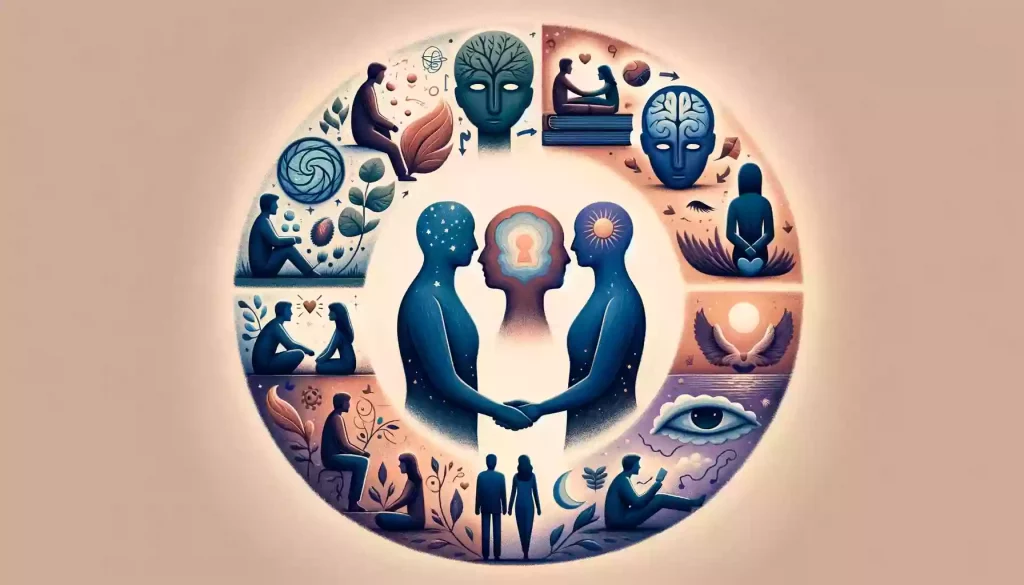Key Takeaways:
- INTJs value deep intellectual connections
- Independence is crucial in INTJ relationships
- Effective communication is key with INTJs
- INTJs appreciate honesty and directness
- Understanding INTJ's unique needs enhances bonds
Understanding the INTJ Personality Type: An Overview
The INTJ personality type, part of the Myers-Briggs Type Indicator, is known for its analytical and strategic mind. Individuals with this personality type are often seen as highly intelligent and capable of deep thinking. They typically enjoy delving into complex problems and finding innovative solutions.
INTJs value logic and efficiency in their approach to life, often leading to a preference for structured and organized environments. This personality type tends to be self-confident, with a strong belief in their abilities and ideas. However, they can sometimes appear reserved or aloof, as they prefer to process their thoughts internally.
One of the defining characteristics of INTJs is their love for independence and autonomy. They are highly self-motivated and prefer to work on their terms. This need for personal space and freedom often extends into their relationships, where they may seek partners who respect their need for solitude and individual pursuits.
In social settings, INTJs might come across as reserved or even a bit standoffish. They usually prefer meaningful, in-depth conversations over small talk, which can make them seem distant in more casual social interactions. Despite this, INTJs are capable of forming deep and lasting connections with those they trust and respect.
INTJs are often future-oriented, constantly planning and preparing for what lies ahead. This forward-thinking nature can be an asset in many areas of life, including career and personal growth. However, it may also lead to challenges in being present and enjoying the moment.
Understanding the INTJ personality type involves recognizing their need for intellectual stimulation, independence, and meaningful interaction. In relationships, these traits can manifest uniquely, influencing how INTJs connect with others.
The Strengths of INTJ Personalities in Relationships
INTJ personalities bring several strengths to their relationships, primarily rooted in their intellectual nature and strategic thinking. These traits can contribute to a rich and fulfilling partnership when understood and appreciated by their significant others.
One key strength of INTJs in relationships is their commitment to honesty and integrity. They value truth and directness, often fostering a transparent and straightforward communication style. This can help build trust and prevent misunderstandings in a relationship.
Another strength of INTJs is their problem-solving ability. They are often able to analyze situations logically and offer creative solutions to complex problems. This can be particularly beneficial in navigating the challenges that arise in relationships.
INTJs also tend to be very loyal and dedicated partners. Once they commit to a relationship, they are usually in it for the long haul. They take their commitments seriously and often go to great lengths to ensure the well-being and happiness of their partners.
Lastly, INTJs are often self-sufficient and independent, which can be a boon in a relationship. This independence means they are less likely to rely on their partners for their happiness or emotional needs, allowing for a more balanced and healthy partnership.
Challenges Faced by INTJs in Romantic Partnerships

INTJs, while possessing many strengths, can also face specific challenges in romantic relationships. Understanding these challenges is crucial for both INTJs and their partners to foster a healthy, supportive partnership.
One significant challenge is the INTJ's preference for logic over emotion. This can sometimes lead to a disconnect in emotional communication, as INTJs may struggle to understand or express their feelings in the way their partners might need.
Another issue is their high standards and perfectionism. INTJs often have a clear vision of what they want in a relationship and can become frustrated if reality does not meet their expectations. This can create tension and dissatisfaction in partnerships.
INTJs' need for independence can also pose a challenge. Their partners might misinterpret this need as emotional detachment or lack of interest, potentially leading to feelings of neglect or misunderstanding.
Their direct communication style, while honest, can sometimes be perceived as harsh or insensitive. It's important for INTJs to be mindful of their partner's emotional needs and for their partners to understand the INTJ's straightforward nature.
INTJs' dislike of small talk and preference for deep, intellectual conversations can sometimes limit their social interactions, making it challenging to connect on a more casual level.
Finally, their future-oriented thinking can sometimes overshadow the present moment, leading to a lack of spontaneity or appreciation for the here and now in the relationship.
Effective Communication Strategies with an INTJ Partner
Communicating effectively with an INTJ requires understanding their unique communication style and adapting accordingly. Here are some strategies to enhance communication with an INTJ partner.
Firstly, be direct and honest. INTJs appreciate straightforward communication and are more receptive to clear, logical arguments than emotional pleas.
It's also important to respect their need for independence and space. Giving an INTJ time to process their thoughts and feelings can lead to more meaningful conversations later.
When discussing issues, focus on problem-solving rather than just expressing emotions. INTJs are naturally inclined to find solutions and are more engaged in conversations that have a clear goal or outcome.
Understanding that INTJs may not be naturally in tune with emotional cues is crucial. Be patient and explicitly state your emotional needs and expectations to avoid misunderstandings.
Encourage and participate in intellectual discussions. Sharing ideas and engaging in deep conversations about shared interests can strengthen your connection with an INTJ.
Lastly, be receptive to the INTJ's feedback. While they might be blunt at times, their insights are often aimed at improving the relationship and come from a place of honesty and care.
Building Emotional Intimacy with an INTJ

Developing emotional intimacy with an INTJ can be a unique and rewarding experience. It involves understanding their perspective and gradually building a deep emotional connection.
One effective approach is engaging in meaningful conversations. INTJs thrive on intellectual stimulation and appreciate deep discussions about interests, ideas, and future aspirations. This can create a strong emotional bond.
It's also important to show appreciation for the INTJ's unique qualities and contributions to the relationship. Recognizing their efforts and understanding their way of expressing affection can enhance emotional intimacy.
Patience is key in building intimacy with an INTJ. They may take time to open up emotionally and require a safe and trusting environment to express their feelings. Being patient and non-judgmental encourages them to share more of their inner world.
Lastly, shared experiences can strengthen emotional ties. Participating in activities that both partners enjoy, or trying new things together, can create meaningful memories and deepen the emotional connection.
The Role of Independence in INTJ Relationships
Independence plays a significant role in the dynamics of a relationship with an INTJ. Understanding and respecting this trait is crucial for a harmonious partnership.
INTJs value their autonomy highly and often seek partners who can respect their need for personal space and time alone. Recognizing this need and not taking it personally is essential for maintaining a healthy relationship.
While INTJs cherish their independence, they also appreciate partners who are self-sufficient. A relationship where both individuals have their own interests and pursuits can be particularly fulfilling for an INTJ.
However, balancing independence with togetherness is important. Finding common ground and shared activities can help maintain a connection without compromising the INTJ's need for autonomy.
Communication about needs and boundaries is vital. Openly discussing expectations regarding independence and together time can prevent misunderstandings and foster mutual respect and understanding in the relationship.
Navigating Conflict Resolution with an INTJ

Resolving conflicts with an INTJ partner involves understanding their logical approach and finding ways to communicate effectively. It's a process that requires patience, clarity, and a focus on problem-solving.
The first step in conflict resolution with an INTJ is to approach the issue logically. Presenting facts and rational arguments can be more effective than emotional appeals. INTJs respect well-thought-out reasoning and are more receptive to discussions that are logical and structured.
It's important to give INTJs space to process the conflict. They often need time to think through issues and may not respond well to being pressured for an immediate resolution. Patience in these situations can lead to more thoughtful and productive outcomes.
Clear and direct communication is key. Be honest and straightforward about your concerns, and avoid ambiguity. INTJs appreciate directness and are more likely to engage in resolution when the communication is clear and concise.
Lastly, focus on finding a solution rather than dwelling on the problem. INTJs are natural problem solvers and are often more interested in finding practical solutions than in rehashing emotional details.
Appreciating the Unique Perspective of INTJs
Appreciating an INTJ's unique perspective can greatly enhance a relationship. INTJs offer a distinct and valuable viewpoint, shaped by their analytical and strategic thinking.
One way to appreciate an INTJ's perspective is by engaging in their intellectual interests. Discussing topics that stimulate their mind shows respect for their intellect and curiosity.
Understanding their need for autonomy and independence is also important. Respecting their space and not taking their need for solitude personally can deepen mutual respect and understanding.
Recognize their efforts in problem-solving and strategic planning. INTJs often put a lot of thought into their actions and decisions, and acknowledging this can show appreciation for their methods and reasoning.
Finally, be open to their honest and direct feedback. While it may sometimes seem blunt, it comes from a place of honesty and a desire for improvement, both personally and in the relationship.
Creating Mutual Understanding in INTJ Partnerships
Creating mutual understanding in a relationship with an INTJ involves recognizing and valuing their unique traits and communication style. It requires effort and empathy from both partners.
One key aspect is acknowledging the INTJ's need for intellectual stimulation. Engaging in meaningful conversations and sharing ideas can help build a stronger connection and mutual understanding.
It's also important to appreciate the INTJ's need for independence. Understanding that their desire for alone time is not a reflection of their feelings for their partner can prevent feelings of neglect or misunderstanding.
Being clear and direct in communication is essential. INTJs value honesty and straightforwardness, so being open and clear about feelings and expectations can help avoid confusion.
Finally, taking the time to learn about the INTJ personality type can be immensely helpful. Understanding their motivations, strengths, and challenges can lead to a deeper and more empathetic connection.
Supporting the Growth of Your INTJ Partner
Supporting the growth of an INTJ partner involves encouraging their intellectual pursuits and respecting their need for autonomy while providing emotional support.
Encourage their intellectual and career goals. INTJs are often driven and ambitious, and supporting their aspirations can show that you value and respect their ambitions.
It's important to offer emotional support, even if INTJs may not always express their feelings openly. Being available and understanding when they do share can create a safe space for emotional expression.
Allowing them the space to explore their interests independently is also crucial. Respecting their need for independence and self-discovery can strengthen the relationship and support their personal growth.
Lastly, engaging in shared growth experiences, such as learning a new skill together or tackling a project, can be a way to support and bond with your INTJ partner while respecting their need for intellectual stimulation.
Balancing Space and Togetherness in INTJ Relationships
Finding a balance between space and togetherness is crucial in a relationship with an INTJ. This balance allows for both personal growth and a deepening of the relationship.
Understanding the INTJ's need for independence is the first step. Recognize that their desire for alone time is not a rejection but a fundamental aspect of their personality.
Communication is key in finding this balance. Discussing and respecting each other's needs for space and togetherness helps in creating a harmonious relationship dynamic.
Planning quality time together is also important. Engaging in activities that both partners enjoy can strengthen the relationship and provide meaningful shared experiences.
Respecting the INTJ's boundaries and not taking their need for solitude personally can prevent misunderstandings and foster a deeper connection.
Lastly, it's essential to appreciate the time spent together. Even if it may be less frequent than in other relationships, the depth and quality of the interaction can be incredibly fulfilling.
The Importance of Intellectual Connection with INTJs
An intellectual connection is often a key component of a successful relationship with an INTJ. This connection fosters mutual understanding and respect.
Engaging in stimulating conversations on topics of mutual interest can strengthen the bond with an INTJ. They appreciate the exchange of ideas and deep discussions.
Supporting and participating in their intellectual pursuits can show appreciation for their interests and enhance the relationship.
Finally, understanding that an intellectual connection is often how INTJs express their affection and interest can help in appreciating and nurturing the relationship.
Decoding INTJ Love Languages
Understanding the love languages of INTJs can significantly enhance relationship dynamics. Recognizing how they express and receive love is key to a deeper connection.
Many INTJs express love through acts of service and quality time. They often show affection by helping their partner solve problems or by dedicating time to shared interests and activities.
Words of affirmation, while not always verbalized, can be significant for INTJs. They may express appreciation and affection through thoughtful messages or in-depth conversations about their feelings.
Physical touch can be an important love language for INTJs, though it often comes with a need for trust and emotional connection first.
Gift-giving for INTJs is usually thoughtful and purposeful. They tend to give gifts that have practical use or significant meaning, rather than just for the sake of tradition.
Understanding these love languages and how they manifest in INTJs can provide invaluable insight into how to strengthen and nurture your relationship with an INTJ partner.
FAQs: Common Questions About Dating an INTJ
Q: How do I know if an INTJ is interested in me?
A: INTJs typically show interest through intellectual engagement, thoughtful conversations, and spending quality time with someone. They may not be overly expressive with emotions, but their interest is often evident through their actions and the time they invest in the relationship.
Q: What should I avoid doing in a relationship with an INTJ?
A: Avoid being vague or ambiguous in communication, disrespecting their need for independence, and pressuring them for emotional expressions they are not comfortable with. It's also advisable to avoid interrupting their alone time, as this is crucial for their well-being.
Q: How can I support my INTJ partner?
A: Support them by respecting their need for independence, engaging in intellectual conversations, being straightforward in communication, and showing appreciation for their unique perspectives and ideas.
Q: Do INTJs like surprises?
A: While INTJs might appreciate well-thought-out surprises, they generally prefer predictability and may not be fond of spontaneous disruptions to their plans. It's best to gauge individual preferences as some INTJs may enjoy surprises more than others.
Q: How do INTJs handle conflict in relationships?
A: INTJs typically approach conflict logically and seek to resolve it through rational discussion. They value clear, honest communication and prefer to focus on practical solutions rather than dwelling on emotional aspects.
Recommended Resources
- The INTJ: Understanding & Relating with the Mastermind by Clayton Geoffreys, CreateSpace Independent Publishing Platform, 2014
- INTJ: Portrait of a Mastermind by Roger R. Pearman, MBTI Trust, Inc., 2005
- Gifts Differing: Understanding Personality Type by Isabel Briggs Myers, Consulting Psychologists Press, 1980
- Personality Types: Using the Enneagram for Self-Discovery by Don Richard Riso and Russ Hudson, Houghton Mifflin Harcourt, 1996

.thumb.jpg.78735a344a3340a866dda54f465baebb.jpg)


.jpg.1626fbc48c04fd9021fd315819807524.thumb.jpg.882936eb5901fa05cf31c75617acde2e.jpg)

Recommended Comments
There are no comments to display.
Create an account or sign in to comment
You need to be a member in order to leave a comment
Create an account
Sign up for a new account in our community. It's easy!
Register a new accountSign in
Already have an account? Sign in here.
Sign In Now